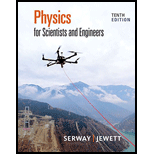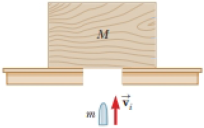
Physics for Scientists and Engineers
10th Edition
ISBN: 9781337553278
Author: Raymond A. Serway, John W. Jewett
Publisher: Cengage Learning
expand_more
expand_more
format_list_bulleted
Textbook Question
Chapter 9, Problem 39AP
A 1.25-kg wooden block rests on a table over a large hole as in Figure P9.39. A 5.00-g bullet with an initial velocity vi is fired upward into the bottom of the block and remains in the block after the collision. The block and bullet rise to a maximum height of 22.0 cm. (a) Describe how you would find the initial velocity of the bullet using ideas you have learned in this chapter. (b) Calculate the initial velocity of the bullet from the information provided.
Figure P9.39 Problems 39 and 40.

Expert Solution & Answer
Trending nowThis is a popular solution!

Students have asked these similar questions
Please don't use Chatgpt will upvote and give handwritten solution
The kinetic energy of a pendulum is greatest
Question 20Select one:
a.
at the top of its swing.
b.
when its potential energy is greatest.
c.
at the bottom of its swing.
d.
when its total energy is greatest.
Part a-D pl
Chapter 9 Solutions
Physics for Scientists and Engineers
Ch. 9.1 - Two objects have equal kinetic energies. How do...Ch. 9.1 - Your physical education teacher throws a baseball...Ch. 9.3 - Two objects are at rest on a frictionless surface....Ch. 9.3 - Rank an automobile dashboard, seat belt, and air...Ch. 9.4 - In a perfectly inelastic one-dimensional collision...Ch. 9.4 - A table-tennis ball is thrown at a stationary...Ch. 9.6 - A baseball bat of uniform density is cut at the...Ch. 9.7 - A cruise ship is moving at constant speed through...Ch. 9 - A particle of mass m moves with momentum of...Ch. 9 - A 3.00-kg particle has a velocity of...
Ch. 9 - A baseball approaches home plate at a speed of...Ch. 9 - A 65.0-kg boy and his 40.0-kg sister, both wearing...Ch. 9 - Two blocks of masses m and 3m are placed on a...Ch. 9 - When you jump straight up as high as you can, what...Ch. 9 - A glider of mass m is free to slide along a...Ch. 9 - You and your brother argue often about how to...Ch. 9 - The front 1.20 m of a 1 400-kg car Ls designed as...Ch. 9 - The magnitude of the net force exerted in the x...Ch. 9 - Water falls without splashing at a rate of 0.250...Ch. 9 - A 1 200-kg car traveling initially at vCi = 25.0...Ch. 9 - A railroad car of mass 2.50 104 kg is moving with...Ch. 9 - Four railroad cars, each of mass 2.50 104 kg, are...Ch. 9 - A car of mass m moving at a speed v1 collides and...Ch. 9 - A 7.00-g bullet, when fired from a gun into a...Ch. 9 - A tennis ball of mass 57.0 g is held just above a...Ch. 9 - (a) Three carts of masses m1 = 4.00 kg, m2 = 10.0...Ch. 9 - You have been hired as an expert witness by an...Ch. 9 - Two shuffleboard disks of equal mass, one orange...Ch. 9 - Two shuffleboard disks of equal mass, one orange...Ch. 9 - A 90.0-kg fullback running east with a speed of...Ch. 9 - A proton, moving with a velocity of vii, collides...Ch. 9 - A uniform piece of sheet metal is shaped as shown...Ch. 9 - Explorers in the jungle find an ancient monument...Ch. 9 - A rod of length 30.0 cm has linear density (mass...Ch. 9 - Consider a system of two particles in the xy...Ch. 9 - The vector position of a 3.50-g particle moving in...Ch. 9 - You have been hired as an expert witness in an...Ch. 9 - Prob. 30PCh. 9 - A 60.0-kg person bends his knees and then jumps...Ch. 9 - A garden hose is held as shown in Figure P9.32....Ch. 9 - A rocket for use in deep space is to be capable of...Ch. 9 - A rocket has total mass Mi = 360 kg, including...Ch. 9 - An amateur skater of mass M is trapped in the...Ch. 9 - (a) Figure P9.36 shows three points in the...Ch. 9 - Review. A 60.0-kg person running at an initial...Ch. 9 - A cannon is rigidly attached to a carriage, which...Ch. 9 - A 1.25-kg wooden block rests on a table over a...Ch. 9 - A wooden block of mass M rests on a table over a...Ch. 9 - Two gliders are set in motion on a horizontal air...Ch. 9 - Pursued by ferocious wolves, you are in a sleigh...Ch. 9 - Review. A student performs a ballistic pendulum...Ch. 9 - Why is the following situation impossible? An...Ch. 9 - Review. A bullet of mass m = 8.00 g is fired into...Ch. 9 - Review. A bullet of mass m is fired into a block...Ch. 9 - A 0.500-kg sphere moving with a velocity expressed...Ch. 9 - Prob. 48APCh. 9 - Review. A light spring of force constant 3.85 N/m...Ch. 9 - Prob. 50APCh. 9 - Review. There are (one can say) three coequal...Ch. 9 - Sand from a stationary hopper falls onto a moving...Ch. 9 - Two particles with masses m and 3m are moving...Ch. 9 - On a horizontal air track, a glider of mass m...
Knowledge Booster
Learn more about
Need a deep-dive on the concept behind this application? Look no further. Learn more about this topic, physics and related others by exploring similar questions and additional content below.Similar questions
- The figure (Figure 1) shows representations of six thermodynamic states of the same ideal gas sample. Figure 1 of 1 Part A ■Review | Constants Rank the states on the basis of the pressure of the gas sample at each state. Rank pressure from highest to lowest. To rank items as equivalent, overlap them. ▸ View Available Hint(s) highest 0 ☐ ☐ ☐ ☐ ☐ ☐ Reset Help B F A D E The correct ranking cannot be determined. Submit Previous Answers × Incorrect; Try Again; 4 attempts remaining Provide Feedback lowest Next >arrow_forwardPart A m 2πkT ) 3/2 Calculate the integral (v) = f vƒ (v)dv. The function f(v) describing the actual distribution of molecular speeds is called the Maxwell-Boltzmann distribution, = ƒ(v) = 4π (· v²e-mv²/2kT . (Hint: Make the change of variable v² =x and use the tabulated integral foxne integer and a is a positive constant.) Express your answer in terms of the variables T, m, and appropriate constants. -ax dx n! - an+1 where n is a positive (v) = ΕΠΙ ΑΣΦ Submit Previous Answers Request Answer ? × Incorrect; Try Again; 4 attempts remaining Al Study Tools Looking for some guidance? Let's work through a few related practice questions before you go back to the real thing. This won't impact your score, so stop at anytime and ask for clarification whenever you need it. Ready to give it a try? Startarrow_forwardStarter the rule of significantarrow_forward
- No chatgpt plsarrow_forwardCar A starts from rest at t = 0 and travels along a straight road with a constant acceleration of 6 ft/s^2 until it reaches a speed of 60ft/s. Afterwards it maintains the speed. Also, when t = 0, car B located 6000 ft down the road is traveling towards A at a constant speed of 80 ft/s. Determine the distance traveled by Car A when they pass each other.Write the solution using pen and draw the graph if needed.arrow_forwardIn the given circuit the charge on the plates of 1 μF capacitor, when 100 V battery is connected to the terminals A and B, will be 2 μF A 1 µF B 3 µFarrow_forward
- The velocity of a particle moves along the x-axis and is given by the equation ds/dt = 40 - 3t^2 m/s. Calculate the acceleration at time t=2 s and t=4 s. Calculate also the total displacement at the given interval. Assume at t=0 s=5m.Write the solution using pen and draw the graph if needed.arrow_forwardThe velocity of a particle moves along the x-axis and is given by the equation ds/dt = 40 - 3t^2 m/s. Calculate the acceleration at time t=2 s and t=4 s. Calculate also the total displacement at the given interval. Assume at t=0 s=5m.Write the solution using pen and draw the graph if needed.arrow_forwardThe velocity of a particle moves along the x-axis and is given by the equation ds/dt = 40 - 3t^2 m/s. Calculate the acceleration at time t=2 s and t=4 s. Calculate also the total displacement at the given interval. Assume at t=0 s=5m.Write the solution using pen and draw the graph if needed. NOT AI PLSarrow_forward
arrow_back_ios
SEE MORE QUESTIONS
arrow_forward_ios
Recommended textbooks for you
 Physics for Scientists and Engineers: Foundations...PhysicsISBN:9781133939146Author:Katz, Debora M.Publisher:Cengage Learning
Physics for Scientists and Engineers: Foundations...PhysicsISBN:9781133939146Author:Katz, Debora M.Publisher:Cengage Learning University Physics Volume 1PhysicsISBN:9781938168277Author:William Moebs, Samuel J. Ling, Jeff SannyPublisher:OpenStax - Rice University
University Physics Volume 1PhysicsISBN:9781938168277Author:William Moebs, Samuel J. Ling, Jeff SannyPublisher:OpenStax - Rice University Physics for Scientists and Engineers with Modern ...PhysicsISBN:9781337553292Author:Raymond A. Serway, John W. JewettPublisher:Cengage Learning
Physics for Scientists and Engineers with Modern ...PhysicsISBN:9781337553292Author:Raymond A. Serway, John W. JewettPublisher:Cengage Learning Physics for Scientists and EngineersPhysicsISBN:9781337553278Author:Raymond A. Serway, John W. JewettPublisher:Cengage Learning
Physics for Scientists and EngineersPhysicsISBN:9781337553278Author:Raymond A. Serway, John W. JewettPublisher:Cengage Learning Physics for Scientists and Engineers, Technology ...PhysicsISBN:9781305116399Author:Raymond A. Serway, John W. JewettPublisher:Cengage Learning
Physics for Scientists and Engineers, Technology ...PhysicsISBN:9781305116399Author:Raymond A. Serway, John W. JewettPublisher:Cengage Learning College PhysicsPhysicsISBN:9781285737027Author:Raymond A. Serway, Chris VuillePublisher:Cengage Learning
College PhysicsPhysicsISBN:9781285737027Author:Raymond A. Serway, Chris VuillePublisher:Cengage Learning

Physics for Scientists and Engineers: Foundations...
Physics
ISBN:9781133939146
Author:Katz, Debora M.
Publisher:Cengage Learning

University Physics Volume 1
Physics
ISBN:9781938168277
Author:William Moebs, Samuel J. Ling, Jeff Sanny
Publisher:OpenStax - Rice University

Physics for Scientists and Engineers with Modern ...
Physics
ISBN:9781337553292
Author:Raymond A. Serway, John W. Jewett
Publisher:Cengage Learning

Physics for Scientists and Engineers
Physics
ISBN:9781337553278
Author:Raymond A. Serway, John W. Jewett
Publisher:Cengage Learning

Physics for Scientists and Engineers, Technology ...
Physics
ISBN:9781305116399
Author:Raymond A. Serway, John W. Jewett
Publisher:Cengage Learning

College Physics
Physics
ISBN:9781285737027
Author:Raymond A. Serway, Chris Vuille
Publisher:Cengage Learning
Impulse Derivation and Demonstration; Author: Flipping Physics;https://www.youtube.com/watch?v=9rwkTnTOB0s;License: Standard YouTube License, CC-BY